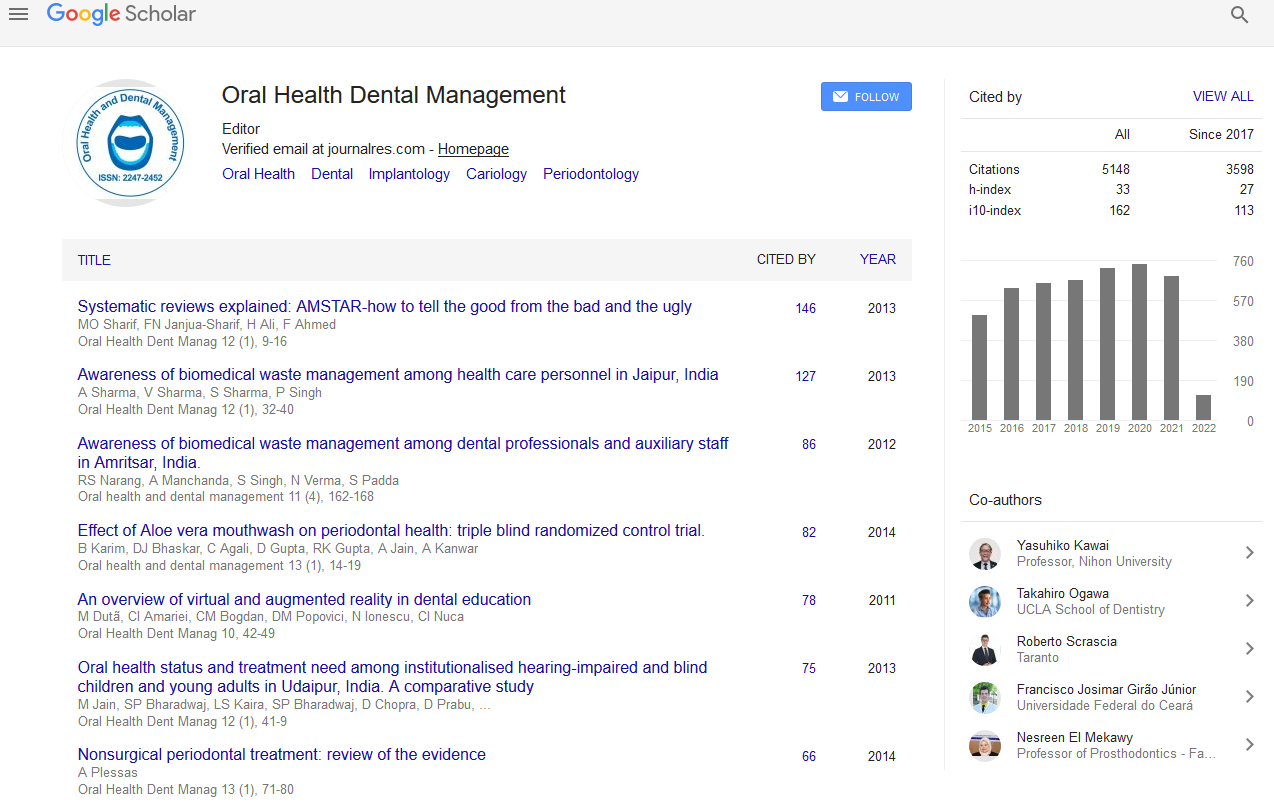Indexed In
- The Global Impact Factor (GIF)
- CiteFactor
- Electronic Journals Library
- RefSeek
- Hamdard University
- EBSCO A-Z
- Virtual Library of Biology (vifabio)
- International committee of medical journals editors (ICMJE)
- Google Scholar
Useful Links
Share This Page
Journal Flyer

Open Access Journals
- Agri and Aquaculture
- Biochemistry
- Bioinformatics & Systems Biology
- Business & Management
- Chemistry
- Clinical Sciences
- Engineering
- Food & Nutrition
- General Science
- Genetics & Molecular Biology
- Immunology & Microbiology
- Medical Sciences
- Neuroscience & Psychology
- Nursing & Health Care
- Pharmaceutical Sciences
The effect of early exposure to haptic feedback during preclinical dental education on the development of psychomotor skills in Restorative Dentistry?
4th Asia Pacific Congress & Expo on Dental and Oral Health
July 27-29, 2015 Brisbane, Australia
Mahmoud M Bakr, Ward L Massey and Heather Alexander
ScientificTracks Abstracts-Workshop: Oral Health Dent Manag
Abstract:
Haptic simulators have been successfully used in medical education but are relatively new tools in dental education. This study aimed to evaluate the effect of early exposure to haptic feedback (via the MOOG Simodont� Virtual Dental Trainer) on the development of psychomotor skills and on the subsequent performance of a previously unseen manual task. Forty (40) second year Dental Science students enrolled at Griffith University (Australia) were randomly divided into two groups. They were then given manual dexterity tasks in a haptic and a non-haptic environment but in a different sequence for each group (early- or late-haptic experience). Pre-experimental, post experimental and flow questionnaires were completed by participants. The Mental Rotation Test ?A (MRT-A) was used to control for differences in visual-spatial abilities. Borg?s CR-10 scale was used to control for possible differences in mental effort between haptic and non-haptic training sessions. Overall, the students accepted the new dental simulator well. Participants commented both positively and negatively on the fidelity of the preclinical experience. The group that ended with haptic training performed slightly (though not significantly) better than the group that commenced training with haptics (Paired t-test; P= 0.06). Our study showed that haptic simulators could be combined with other methods in preclinical dental skills development but there is no clear evidence in this study that early exposure per se to haptic feedback and the MOOG Simodont� Virtual Dental Trainer could better assist in the development of psychomotor skills in Restorative Dentistry.
Biography :
Dr. Bakr received his Bachelor Degree in Dental Medicine and Surgery from Cairo University in 2004. He completed his Master?s Degree in Oral Biology from Cairo University in 2010. He was appointed as an academic within different departments in the Faculty of Dentistry (Cairo University) with a special focus on Oral Histopathology and Restorative Dentistry in 2005, where he gained experience in Dental Education for five years. After moving to Australia in 2010, Dr. Bakr was appointed to teach within the School of Biomedical Sciences (University of Queensland). Dr. Bakr held different positions in Griffith University including sessional teaching of Oral Biology, Head and Neck Anatomy, sessional clinical supervision, Casual lecturing in Restorative Dentistry, besides being appointed as a Research Assistant in the Haptic Dental Simulation (Simodont�) research project. In 2012, was Dr. Bakr was appointed as a full-time Lecturer in General Dental Practice. In 2013, he completed a Graduate Certificate in Higher Education from Griffith University. Currently Dr. Bakr doing a PhD investigating the role of PTH in the healing of stress fractures in bone.

